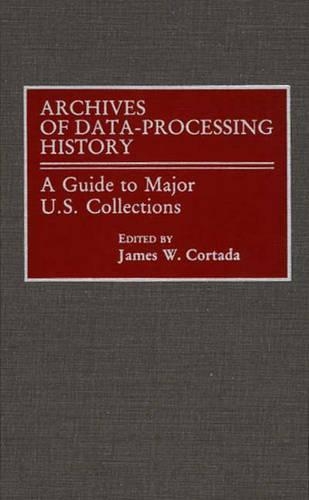
Archives of Data-Processing History: A Guide to Major U.S. Collections
(Hardback)
Publishing Details
Archives of Data-Processing History: A Guide to Major U.S. Collections
By (Author) James W. Cortada
Bloomsbury Publishing PLC
Greenwood Press
24th April 1990
United States
Classifications
Tertiary Education
Non Fiction
016.00409
Physical Properties
Hardback
195
Description
The history of the computer, and of the industry it spawned, is the latest entrant into the field of historical studies. Scholars beginning to turn their attention to the subject of computing need James Cortada's Archives of Data Procesing History as a brief introduction to sources immediately available for investigation. Each essay provides an overview of a major government, academic, or industrial archival collection dealing with the history of computing, the industry, and its leaders and is written by the archivist/historian who has worked with or is responsible for the collection. The archives give practical information on hours, organization, contacts, telephone numbers, survey of contents, and assessments of the historical significance of the collections and their institutions. Reference and business librarians will definitely want to add this volume to their collections. Those interested in the history of technology, the business history of the industry, and the history of major institutions will want to consult it.
Reviews
An annotated bibliography of 4551 items related to the history of data processing that expands upon the author's earlier An Annotated Bibliography on the History of Data Processing (Greenwood, 1983). The volume is organized into approximately 100 subcategories within nine main chapters: Reference and Introductory Materials; Pre-History of Information Processing; Origins of Modern Computing; Between Two World Wars; Hardware, 1939-1960s; Hardware, 1960s-1980s; Programming Languages; Software and Applications; and Information Processing Industry. Each chapter has a brief introduction outlining important historical issues and includes comments on the literature. Ongoing publications are also identified for those wishing to track issues on a continuing basis. The volume concludes with author and subject indices.-Science, Technology and Society
Some people call it information processing and some call it data processing (sort of like 'you say tomato, I say tomato'). Whatever one's perspective, there is no disputing the fact that computers have revolutionized society. The collecting of this revolution's history is the subject of Archives of Data-Processing History: A Guide to Major U.S. Collections. Editied by James W. Cortada, the book provides overviews of major archival collections dealing with the history of computing. Twelve collections, including those of the University of Minnesota's Charles Babbage Institute, the Library of Congress, and the IBM Archives, are described in separate essays. (I wonder who is vying for the rights to document NREN's developing history) Each essay gives basic information on the institution (hours, telephone numbers, etc.), surveys the collection's contents, and assesses its historical significance.-American Libraries
The history of the computer, and of the industry it spawned, is the latest entrant into the field of historical studies. Each essay provides an overview of a major government, academic, or industrial archival collection dealing with the history of computing, the industry, and its leaders and is written by the archivist/historian who has worked with or is responsible for the collection. The archives give practical information on hours, organization, contacts, telephone numbers, survey of contents, and assessment of the historical significance of the collections and their institutions. Those interested in the history of technology, the business history of major institutions will want to consult it.-IEEE Spectrum
"An annotated bibliography of 4551 items related to the history of data processing that expands upon the author's earlier An Annotated Bibliography on the History of Data Processing (Greenwood, 1983). The volume is organized into approximately 100 subcategories within nine main chapters: Reference and Introductory Materials; Pre-History of Information Processing; Origins of Modern Computing; Between Two World Wars; Hardware, 1939-1960s; Hardware, 1960s-1980s; Programming Languages; Software and Applications; and Information Processing Industry. Each chapter has a brief introduction outlining important historical issues and includes comments on the literature. Ongoing publications are also identified for those wishing to track issues on a continuing basis. The volume concludes with author and subject indices."-Science, Technology and Society
"The history of the computer, and of the industry it spawned, is the latest entrant into the field of historical studies. Each essay provides an overview of a major government, academic, or industrial archival collection dealing with the history of computing, the industry, and its leaders and is written by the archivist/historian who has worked with or is responsible for the collection. The archives give practical information on hours, organization, contacts, telephone numbers, survey of contents, and assessment of the historical significance of the collections and their institutions. Those interested in the history of technology, the business history of major institutions will want to consult it."-IEEE Spectrum
"Some people call it information processing and some call it data processing (sort of like 'you say tomato, I say tomato'). Whatever one's perspective, there is no disputing the fact that computers have revolutionized society. The collecting of this revolution's history is the subject of Archives of Data-Processing History: A Guide to Major U.S. Collections. Editied by James W. Cortada, the book provides overviews of major archival collections dealing with the history of computing. Twelve collections, including those of the University of Minnesota's Charles Babbage Institute, the Library of Congress, and the IBM Archives, are described in separate essays. (I wonder who is vying for the rights to document NREN's developing history) Each essay gives basic information on the institution (hours, telephone numbers, etc.), surveys the collection's contents, and assesses its historical significance."-American Libraries
Author Bio
JAMES W. CORTADA is a Marketing Branch Manager for IBM USA in Madison, Wisconsin. This book rounds out a broad project involving a bibliography entitled An Annotated Bibliography on the History of Data Processing (Greenwood Press, 1983), and a three-volume Historical Dictionary of Data Processing (Greenwood Press, 1987) designed as reference materials for the professional historian.
